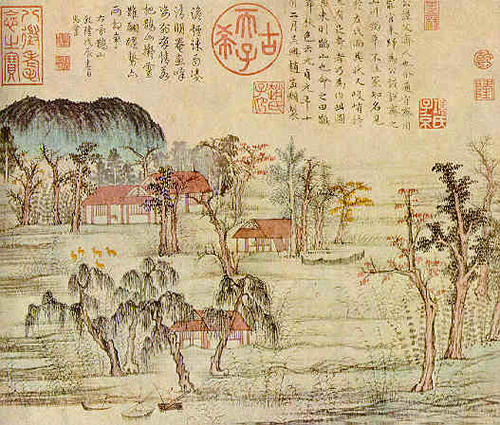
Autumn Colors on the Ch'iao and Hua Mountains by Zhao Mengfu (1254-1322), National Palace Museum, Taipei
Until about 20 years ago, most scholars of Mongol-era China emphasized the destructive influence of Mongol rule.
One major scholar of Chinese history even wrote: "The Mongols brought violence and destruction to all aspects of China's civilization. [They were] insensitive to Chinese cultural values, distrustful of Chinese influences, and inept heads of Chinese government." This assessment fits in with the traditional evaluation of the Mongols as barbarians interested primarily in maiming, plundering, destroying, and killing.
As a 13th-century Persian historian wrote of the Mongol campaigns: "With one stroke a world which billowed with fertility was laid desolate, and the regions thereof became a desert, and the greater part of the living, dead, and their skin and bones crumbling dust, and the mighty were humbled and immersed in the calamities of perdition."
It is true that the Mongols, in their conquest of both North and South China, did considerable damage to these territories, and that great loss of life certainly ensued. The population of North China did decline somewhat, though earlier estimates that there was a catastrophic decline in population have subsequently been revised.
It is also true that the Mongols eliminated one of the most basic of Chinese institutions — the civil service examinations. The examinations remained banned until 1315, and even after the ban was lifted, they were no longer the only means to officialdom for the Yuan Dynasty, the dynasty that the Mongols founded in 1271 C.E., as they had been in the past.
The Mongols perceived China as just one section of their vast empire. And they classified the population of their domain in China into a hierarchy of four groups — with the native Chinese at the bottom. The Mongols, of course, were at the top; then came the non-Han, mostly Islamic population that was brought to China by the Mongols to help them rule; third were the northern Chinese; and at the very bottom of the rung were the southern Chinese.
The Mongol rulers were somewhat distrustful of the Confucian scholar-officials of China because they represented a different path for China than that which they themselves had conceived. These scholars, and other native Chinese, thus were not eligible for some of the top positions in the ruling government.